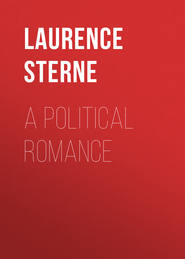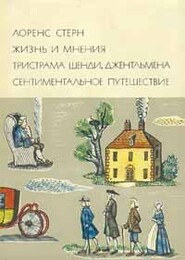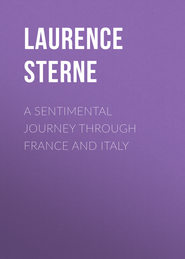По всем вопросам обращайтесь на: info@litportal.ru
(©) 2003-2025.
✖
The Life and Opinions of Tristram Shandy, Gentleman
Настройки чтения
Размер шрифта
Высота строк
Поля
Now every word of this, quoth my uncle Toby, is Arabic to me.—I wish, said Yorick, 'twas so, to half the world.
–Ilus, (footnote in Greek Sanchuniatho.) continued my father, circumcised his whole army one morning.—Not without a court martial? cried my uncle Toby.—Though the learned, continued he, taking no notice of my uncle Toby's remark, but turning to Yorick,—are greatly divided still who Ilus was;—some say Saturn;—some the Supreme Being;—others, no more than a brigadier general under Pharaoh-neco.—Let him be who he will, said my uncle Toby, I know not by what article of war he could justify it.
The controvertists, answered my father, assign two-and-twenty different reasons for it:—others, indeed, who have drawn their pens on the opposite side of the question, have shewn the world the futility of the greatest part of them.—But then again, our best polemic divines—I wish there was not a polemic divine, said Yorick, in the kingdom;—one ounce of practical divinity—is worth a painted ship-load of all their reverences have imported these fifty years.—Pray, Mr. Yorick, quoth my uncle Toby,—do tell me what a polemic divine is?—The best description, captain Shandy, I have ever read, is of a couple of 'em, replied Yorick, in the account of the battle fought single hands betwixt Gymnast and captain Tripet; which I have in my pocket.—I beg I may hear it, quoth my uncle Toby earnestly.—You shall, said Yorick.—And as the corporal is waiting for me at the door,—and I know the description of a battle will do the poor fellow more good than his supper,—I beg, brother, you'll give him leave to come in.—With all my soul, said my father.—Trim came in, erect and happy as an emperor; and having shut the door, Yorick took a book from his right-hand coat-pocket, and read, or pretended to read, as follows.
Chapter 3.XXIX
—'which words being heard by all the soldiers which were there, divers of them being inwardly terrified, did shrink back and make room for the assailant: all this did Gymnast very well remark and consider; and therefore, making as if he would have alighted from off his horse, as he was poising himself on the mounting side, he most nimbly (with his short sword by this thigh) shifting his feet in the stirrup, and performing the stirrup-leather feat, whereby, after the inclining of his body downwards, he forthwith launched himself aloft into the air, and placed both his feet together upon the saddle, standing upright, with his back turned towards his horse's head,—Now, (said he) my case goes forward. Then suddenly in the same posture wherein he was, he fetched a gambol upon one foot, and turning to the left-hand, failed not to carry his body perfectly round, just into his former position, without missing one jot.—Ha! said Tripet, I will not do that at this time,—and not without cause. Well, said Gymnast, I have failed,—I will undo this leap; then with a marvellous strength and agility, turning towards the right-hand, he fetched another striking gambol as before; which done, he set his right hand thumb upon the bow of the saddle, raised himself up, and sprung into the air, poising and upholding his whole weight upon the muscle and nerve of the said thumb, and so turned and whirled himself about three times: at the fourth, reversing his body, and overturning it upside down, and foreside back, without touching any thing, he brought himself betwixt the horse's two ears, and then giving himself a jerking swing, he seated himself upon the crupper—'
(This can't be fighting, said my uncle Toby.—The corporal shook his head at it.—Have patience, said Yorick.)
'Then (Tripet) pass'd his right leg over his saddle, and placed himself en croup.—But, said he, 'twere better for me to get into the saddle; then putting the thumbs of both hands upon the crupper before him, and there-upon leaning himself, as upon the only supporters of his body, he incontinently turned heels over head in the air, and strait found himself betwixt the bow of the saddle in a tolerable seat; then springing into the air with a summerset, he turned him about like a wind-mill, and made above a hundred frisks, turns, and demi-pommadas.'—Good God! cried Trim, losing all patience,—one home thrust of a bayonet is worth it all.—I think so too, replied Yorick.—
I am of a contrary opinion, quoth my father.
Chapter 3.XXX
—No,—I think I have advanced nothing, replied my father, making answer to a question which Yorick had taken the liberty to put to him,—I have advanced nothing in the Tristra-paedia, but what is as clear as any one proposition in Euclid.—Reach me, Trim, that book from off the scrutoir:—it has oft-times been in my mind, continued my father, to have read it over both to you, Yorick, and to my brother Toby, and I think it a little unfriendly in myself, in not having done it long ago:—shall we have a short chapter or two now,—and a chapter or two hereafter, as occasions serve; and so on, till we get through the whole? My uncle Toby and Yorick made the obeisance which was proper; and the corporal, though he was not included in the compliment, laid his hand upon his breast, and made his bow at the same time.—The company smiled. Trim, quoth my father, has paid the full price for staying out the entertainment.—He did not seem to relish the play, replied Yorick.—'Twas a Tom-fool-battle, an' please your reverence, of captain Tripet's and that other officer, making so many summersets, as they advanced;—the French come on capering now and then in that way,—but not quite so much.
My uncle Toby never felt the consciousness of his existence with more complacency than what the corporal's, and his own reflections, made him do at that moment;—he lighted his pipe,—Yorick drew his chair closer to the table,—Trim snuff'd the candle,—my father stirr'd up the fire,—took up the book,—cough'd twice, and begun.
Chapter 3.XXXI
The first thirty pages, said my father, turning over the leaves,—are a little dry; and as they are not closely connected with the subject,—for the present we'll pass them by: 'tis a prefatory introduction, continued my father, or an introductory preface (for I am not determined which name to give it) upon political or civil government; the foundation of which being laid in the first conjunction betwixt male and female, for procreation of the species—I was insensibly led into it.—'Twas natural, said Yorick.
The original of society, continued my father, I'm satisfied is, what Politian tells us, i. e. merely conjugal; and nothing more than the getting together of one man and one woman;—to which, (according to Hesiod) the philosopher adds a servant:—but supposing in the first beginning there were no men servants born—he lays the foundation of it, in a man,—a woman—and a bull.—I believe 'tis an ox, quoth Yorick, quoting the passage (Greek)—A bull must have given more trouble than his head was worth.—But there is a better reason still, said my father (dipping his pen into his ink); for the ox being the most patient of animals, and the most useful withal in tilling the ground for their nourishment,—was the properest instrument, and emblem too, for the new joined couple, that the creation could have associated with them.—And there is a stronger reason, added my uncle Toby, than them all for the ox.—My father had not power to take his pen out of his ink-horn, till he had heard my uncle Toby's reason.—For when the ground was tilled, said my uncle Toby, and made worth inclosing, then they began to secure it by walls and ditches, which was the origin of fortification.—True, true, dear Toby, cried my father, striking out the bull, and putting the ox in his place.
My father gave Trim a nod, to snuff the candle, and resumed his discourse.
–I enter upon this speculation, said my father carelessly, and half shutting the book, as he went on, merely to shew the foundation of the natural relation between a father and his child; the right and jurisdiction over whom he acquires these several ways—
1st, by marriage.
2d, by adoption.
3d, by legitimation.
And 4th, by procreation; all which I consider in their order.
I lay a slight stress upon one of them, replied Yorick—the act, especially where it ends there, in my opinion lays as little obligation upon the child, as it conveys power to the father.—You are wrong,—said my father argutely, and for this plain reason....—I own, added my father, that the offspring, upon this account, is not so under the power and jurisdiction of the mother.—But the reason, replied Yorick, equally holds good for her.—She is under authority herself, said my father:—and besides, continued my father, nodding his head, and laying his finger upon the side of his nose, as he assigned his reason,—she is not the principal agent, Yorick.—In what, quoth my uncle Toby? stopping his pipe.—Though by all means, added my father (not attending to my uncle Toby), 'The son ought to pay her respect,' as you may read, Yorick, at large in the first book of the Institutes of Justinian, at the eleventh title and the tenth section.—I can read it as well, replied Yorick, in the Catechism.
Chapter 3.XXXII
Trim can repeat every word of it by heart, quoth my uncle Toby.—Pugh! said my father, not caring to be interrupted with Trim's saying his Catechism. He can, upon my honour, replied my uncle Toby.—Ask him, Mr. Yorick, any question you please.—
–The fifth Commandment, Trim,—said Yorick, speaking mildly, and with a gentle nod, as to a modest Catechumen. The corporal stood silent.—You don't ask him right, said my uncle Toby, raising his voice, and giving it rapidly like the word of command:—The fifth—cried my uncle Toby.—I must begin with the first, an' please your honour, said the corporal.—
–Yorick could not forbear smiling.—Your reverence does not consider, said the corporal, shouldering his stick like a musket, and marching into the middle of the room, to illustrate his position,—that 'tis exactly the same thing, as doing one's exercise in the field.—
'Join your right-hand to your firelock,' cried the corporal, giving the word of command, and performing the motion.—
'Poise your firelock,' cried the corporal, doing the duty still both of adjutant and private man.
'Rest your firelock;'—one motion, an' please your reverence, you see leads into another.—If his honour will begin but with the first—
The First—cried my uncle Toby, setting his hand upon his side—....
The Second—cried my uncle Toby, waving his tobacco-pipe, as he would have done his sword at the head of a regiment.—The corporal went through his manual with exactness; and having honoured his father and mother, made a low bow, and fell back to the side of the room.
Every thing in this world, said my father, is big with jest, and has wit in it, and instruction too,—if we can but find it out.
–Here is the scaffold work of Instruction, its true point of folly, without the Building behind it.
–Here is the glass for pedagogues, preceptors, tutors, governors, gerund-grinders, and bear-leaders to view themselves in, in their true dimensions.—
Oh! there is a husk and shell, Yorick, which grows up with learning, which their unskilfulness knows not how to fling away!
–Sciences May Be Learned by Rote But Wisdom Not.
Yorick thought my father inspired.—I will enter into obligations this moment, said my father, to lay out all my aunt Dinah's legacy in charitable uses (of which, by the bye, my father had no high opinion), if the corporal has any one determinate idea annexed to any one word he has repeated.—Prithee, Trim, quoth my father, turning round to him,—What dost thou mean, by 'honouring thy father and mother?'
Allowing them, an' please your honour, three halfpence a day out of my pay, when they grow old.—And didst thou do that, Trim? said Yorick.—He did indeed, replied my uncle Toby.—Then, Trim, said Yorick, springing out of his chair, and taking the corporal by the hand, thou art the best commentator upon that part of the Decalogue; and I honour thee more for it, corporal Trim, than if thou hadst had a hand in the Talmud itself.
Chapter 3.XXXIII
O blessed health! cried my father, making an exclamation, as he turned over the leaves to the next chapter, thou art before all gold and treasure; 'tis thou who enlargest the soul,—and openest all its powers to receive instruction and to relish virtue.—He that has thee, has little more to wish for;—and he that is so wretched as to want thee,—wants every thing with thee.
I have concentrated all that can be said upon this important head, said my father, into a very little room, therefore we'll read the chapter quite through.
My father read as follows:
'The whole secret of health depending upon the due contention for mastery betwixt the radical heat and the radical moisture'—You have proved that matter of fact, I suppose, above, said Yorick. Sufficiently, replied my father.
In saying this, my father shut the book,—not as if he resolved to read no more of it, for he kept his fore-finger in the chapter:—nor pettishly,—for he shut the book slowly; his thumb resting, when he had done it, upon the upper-side of the cover, as his three fingers supported the lower side of it, without the least compressive violence.—
I have demonstrated the truth of that point, quoth my father, nodding to Yorick, most sufficiently in the preceding chapter.
Now could the man in the moon be told, that a man in the earth had wrote a chapter, sufficiently demonstrating, That the secret of all health depended upon the due contention for mastery betwixt the radical heat and the radical moisture,—and that he had managed the point so well, that there was not one single word wet or dry upon radical heat or radical moisture, throughout the whole chapter,—or a single syllable in it, pro or con, directly or indirectly, upon the contention betwixt these two powers in any part of the animal oeconomy—
'O thou eternal Maker of all beings!'—he would cry, striking his breast with his right hand (in case he had one)—'Thou whose power and goodness can enlarge the faculties of thy creatures to this infinite degree of excellence and perfection,—What have we Moonites done?'
Chapter 3.XXXIV
With two strokes, the one at Hippocrates, the other at Lord Verulam, did my father achieve it.
The stroke at the prince of physicians, with which he began, was no more than a short insult upon his sorrowful complaint of the Ars longa,—and Vita brevis.—Life short, cried my father,—and the art of healing tedious! And who are we to thank for both the one and the other, but the ignorance of quacks themselves,—and the stage-loads of chymical nostrums, and peripatetic lumber, with which, in all ages, they have first flatter'd the world, and at last deceived it?
–O my lord Verulam! cried my father, turning from Hippocrates, and making his second stroke at him, as the principal of nostrum-mongers, and the fittest to be made an example of to the rest,—What shall I say to thee, my great lord Verulam? What shall I say to thy internal spirit,—thy opium, thy salt-petre,—thy greasy unctions,—thy daily purges,—thy nightly clysters, and succedaneums?











